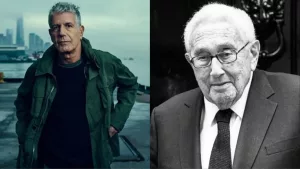Renowned chef and globe-trotting television host Anthony Bourdain‘s outspoken remarks about former Secretary of State Henry Kissinger have resurfaced following Kissinger‘s recent passing at the age of 100. While eulogies and reflections on Kissinger’s legacy dominate headlines, Bourdain‘s unapologetic criticism sheds light on the controversial aspects of the late diplomat’s career.
Henry Kissinger, who served under Presidents Richard Nixon and Gerald Ford, faced accusations of war crimes during his tenure. Bourdain, a fearless traveler and commentator, did not shy away from expressing his disdain for the diplomat, particularly about Kissinger‘s alleged involvement in the secret bombing of Cambodia and support for Argentina’s military dictatorship.
Bourdain‘s 2001 book, “A Cook’s Tour,” contains scathing remarks about Kissinger, stating, “Once you’ve been to Cambodia, you’ll never stop wanting to beat Henry Kissinger to death with your bare hands.” The celebrity chef’s visceral critique extends to Kissinger‘s actions in Cambodia, accusing him of treachery, prevarication, and complicity in murder.
In a 2002 interview with the New Yorker, Bourdain reiterated his strong feelings toward Kissinger, suggesting that journalists who treated the politician with politeness should be reprimanded. He emphasized his belief in moral gray areas but asserted that Kissinger should be barred from dining in any New York establishment.
As news of Kissinger‘s death spread, netizens revisited Bourdain‘s bold statements, with some expressing little remorse and echoing the late chef’s sentiments. The juxtaposition of the two figures – Kissinger, a key political figure, and Bourdain, an unfiltered voice against perceived injustice – adds nuance to discussions surrounding Kissinger‘s legacy.
Bourdain‘s words remind him of the complexities of evaluating political figures and the unapologetic nature of his commentary that resonates even beyond his own passing.

